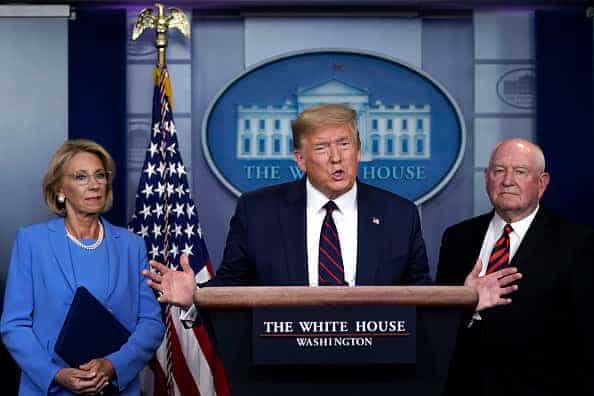At 4PM today (Mar. 27), Donald Trump signed a historic $2 trillion Coronavirus relief bill that was made to financially aid citizens during the pandemic that is actively keeping people from working.
This bill is believed to be the largest spending package in U.S. history which consists of one-time payments to individuals, health-care funding, as well as loans and grants to businesses to stop layoffs.
According to the White House and congressional leaders, some individuals will receive their direct payments of $1200 within three weeks.
Here is how the stimulus package affects you.
One Time Payments:
Individuals who have earned up to $99,000 will be eligible to receive one time payments as part of “The Care Act.” Income is based on your most recent tax return (2019 or 2018).
- Single filers who made up to $75,000 will receive $1,200.
- Married couples who earned up to $150,000 receive $2,400.
- Those with children receive an extra $500 per child under 17-years-old.
- Payments would start phasing out for individuals with adjusted gross incomes of more than $75,000. The amount would then be reduced by $5 for every additional $100 of adjusted gross income.
- Singles who earn $99,000 and married couples who earn $198,000 (without children) are excluded from receiving the stimulus package.
Americans who are overdue on child support could see their cash payments reduced or eliminated as part of this package.
The money will be deposited directly into your bank account if you received your tax refund through direct deposit the past two years. If you did not, the IRS will send out checks in the mail.
It may take up to three weeks for you to receive the money that is owed to you.
For more information on the status of the bill visit the IRS formal website.
Unemployment Benefits:
The bill also helps those who have been laid off during this difficult time. Here are the benefits that you will receive due to the newly signed “Care Act.”
- Those who file for unemployment will receive an additional $600 per week on top of your normal state benefits.
- The additional benefits have been extended to four months.
- Benefits have been extended to a total of 39 weeks (from 26 weeks).
- Those who normally would not qualify for unemployment may under this package including: independent contractors, online platform workers, contract firm workers, on-call workers and temporary workers.
- Workers who are furloughed, but haven’t been fully laid off are eligible for unemployment
- Workers who were not laid off, but cannot work due to a reason due to the COVID-19 virus would be eligible.
- 7-day waiting period before receiving benefits has been waived.
Paid Family Leave:
If you are a worker in a business with less than 500 employees, you can get up to 12 weeks of family leave if you have to stay home with children due to the closures of schools and daycare centers due to the COVID-19 outbreak.
Paid Sick Leave:
Part-time & full-time workers who cannot work because they are under quarantine or receiving treatment for COVID-19 today will receive 80 hours of paid sick leave at full pay.
Student Loans:
Those with Federal Student Loans can be deferred, without interest until September 30, 2020.
Tax Filing Extended:
Tax deadline has been extended from April 15 to July 15.
Retirement:
Those with retirement accounts can withdraw accounts up to $100,000 penalty-free to address any hardship due to COVID-19.
Small Businesses:
Small business owners ( 500 or fewer employees) who took out loans to use for payrolls that include: “employee salaries, cash tips, paid sick leave, insurance premiums, mortgage payments, utilities, and other debt obligations” will be forgiven IF they retain their workers, or rehire workers that were laid off during this time.
For more information on how the “Care Act” impacts your immediate life visit Forbes or Yahoo! Finance websites, information that was used for this article.

